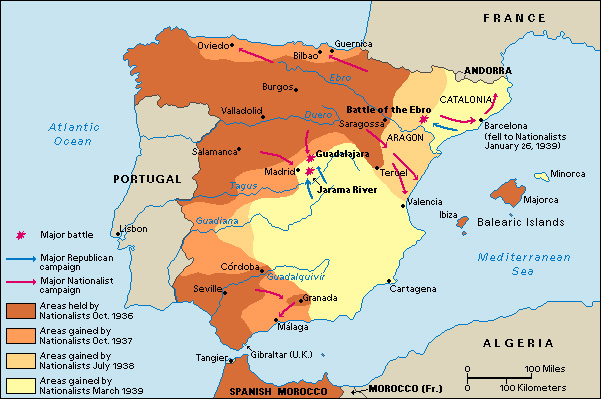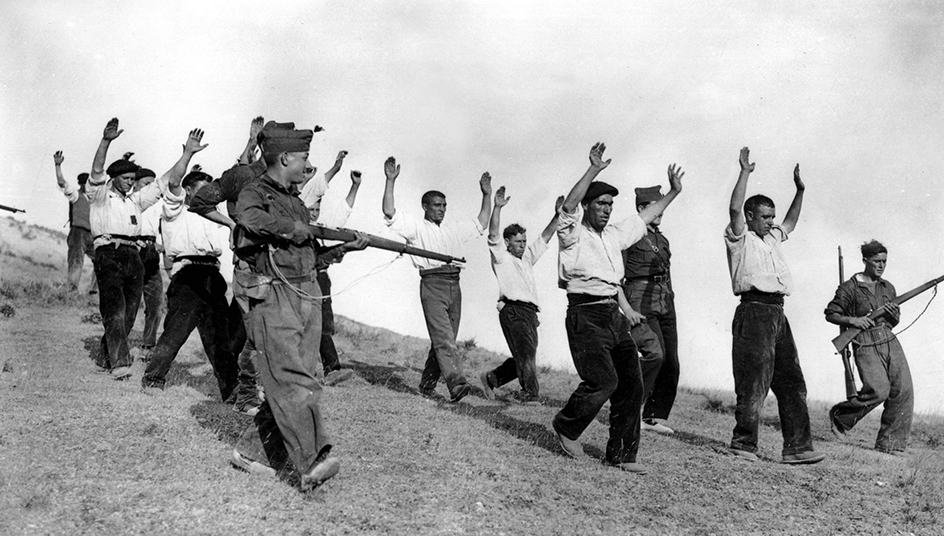Abraham Lincoln Brigade is the collective name for the volunteers from the United States who participated in the Spanish Civil War (1936-1939). In the Spanish Civil War, forces supporting Spain’s democratically elected government, known as Republicans or Loyalists, battled conservative rebels known as Nationalists. During the war, volunteers from around the world formed the International Brigades. These groups traveled to Spain to fight alongside the Republicans against the Nationalist forces led by General Francisco Franco.


Most English-speaking volunteers served in one of the battalions of the XV International Brigade. These battalions eventually included the Abraham Lincoln and George Washington battalions, named for U.S. presidents. They also included the Mackenzie-Papineau Battalion (the Mac-Paps). That group was named for William Lyon Mackenzie and Louis Joseph Papineau, who led rebellions in 1837 seeking independence for parts of modern-day Canada. American and Canadian volunteers served in all three battalions and in some other units. Today, however, the Canadians who served in the war are often collectively called the Mackenzie-Papineau Battalion, just as the U.S. volunteers are collectively called the Abraham Lincoln Brigade. Altogether, about 2,800 Americans and 1,300 Canadians fought in the war or served in medical and transportation units.
The Spanish Civil War broke out after military leaders launched a rebellion against Spain’s elected government in July 1936. In August, most European countries agreed not to intervene. They feared that the conflict would spread beyond Spain. Nazi Germany and Fascist Italy, however, violated the agreement and provided military aid, equipment, and troops to Franco’s army. In return, the Soviet Union provided the Republicans with aid and military equipment.
The Soviet Union sent only a small number of troops, but the Comintern—a Soviet-led Communist organization—recruited volunteers for the International Brigades. The International Brigades eventually consisted of more than 35,000 volunteers from more than 50 nations. Famous American writers and artists, including Ernest Hemingway, Langston Hughes, Dorothy Parker, and Paul Robeson, publicly supported the cause of the International Brigades.
Most of the volunteers in the Abraham Lincoln Brigade were members of the Communist Party. The party viewed the Spanish Civil War as a struggle against fascism, an extreme form of authoritarian government. The first volunteers in the Lincoln Brigade arrived in Spain and began training in January 1937. They fought in battles at the Jarama River, at Brunete, in the Aragon region, and at Teruel. In the spring of 1938, Franco’s forces broke through the Republican lines. The Lincoln Brigade became surrounded as it fought desperately in a series of skirmishes known as the Great Retreats. During the summer of 1938, the brigade participated in a major counterattack across the Ebro River.
Over the course of the war, about one-third of the U.S. volunteers were killed in action, along with nearly half the Canadians. In September 1938, the Republican government discontinued the use of International forces. Over the next several months, the surviving international volunteers returned to their home countries. The war ended with a Nationalist victory on April 1, 1939. Franco ruled Spain as a dictator until his death in 1975.
Because of the Lincoln Brigade‘s link to Communism, the U.S. government viewed its survivors with suspicion during the Cold War. Brigade veterans were denied jobs and faced harassment by the Federal Bureau of Investigation. Cold War tensions eased in the 1980’s, and public opinion eventually shifted in favor of the Lincoln veterans. Memorials to the bravery and sacrifice of the Abraham Lincoln Brigade volunteers have been erected in such cities as Madison, Wisconsin; Seattle; and San Francisco.
See also Fascism ; Franco, Francisco ; Spanish Civil War .
